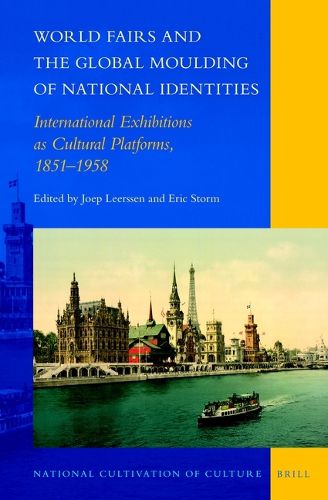Readings Newsletter
Become a Readings Member to make your shopping experience even easier.
Sign in or sign up for free!
You’re not far away from qualifying for FREE standard shipping within Australia
You’ve qualified for FREE standard shipping within Australia
The cart is loading…






This volume examines the role of the broad variety of international exhibitions between 1851 and 1958 in two programmatic essays and twelve case studies, covering not just France and the United States, but also, among others, Sweden, Romania, Colombia, Japan and the nascent European Community.
World fairs were global platforms for the construction of national identities. The mix of national self-profiling and commercial exoticism turned the nation into a brand , while reframing the nation-state from its nineteenth-century positioning amidst neighbouring enemies towards being a competitor in a global, consumer-oriented trade and entertainment economy. By presenting national identities in banal form as feelgood factors, world fairs helped the nation to maintain its grassroots appeal across the century of totalitarianism and internationalism.
Contributors are: Joep Leerssen, Eric Storm, Florian Gross, Anthony Swift, Cosmin Minea, Claire Hendren, Taka Oshikiri, Robert W. Rydell, Sven Schuster, Miriam Oesterreich, Bartosz Dziewanowski-Stefanczyk, Christina Romlid, Jonathan Voges, and Anastasia Remes.
$9.00 standard shipping within Australia
FREE standard shipping within Australia for orders over $100.00
Express & International shipping calculated at checkout
This volume examines the role of the broad variety of international exhibitions between 1851 and 1958 in two programmatic essays and twelve case studies, covering not just France and the United States, but also, among others, Sweden, Romania, Colombia, Japan and the nascent European Community.
World fairs were global platforms for the construction of national identities. The mix of national self-profiling and commercial exoticism turned the nation into a brand , while reframing the nation-state from its nineteenth-century positioning amidst neighbouring enemies towards being a competitor in a global, consumer-oriented trade and entertainment economy. By presenting national identities in banal form as feelgood factors, world fairs helped the nation to maintain its grassroots appeal across the century of totalitarianism and internationalism.
Contributors are: Joep Leerssen, Eric Storm, Florian Gross, Anthony Swift, Cosmin Minea, Claire Hendren, Taka Oshikiri, Robert W. Rydell, Sven Schuster, Miriam Oesterreich, Bartosz Dziewanowski-Stefanczyk, Christina Romlid, Jonathan Voges, and Anastasia Remes.